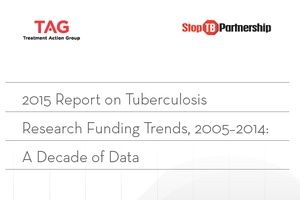Tuberculosis research funding crisis imperils elimination goal
TAG's annual Report on Tuberculosis Research Funding Trends shows that worldwide funding for tuberculosis research fell $1.3 billion short of global targets in 2014.
CAPE TOWN, SOUTH AFRICA, NOVEMBER 30, 2015—Worldwide funding for tuberculosis (TB) research fell $1.3 billion short of global targets in 2014, according to a report released today by Treatment Action Group (TAG). Total funding of US$674,036,492 in 2014 amounted to barely one-third of the US$2 billion experts estimate the world must spend on TB research and development (R&D) each year to eliminate TB. Alarmingly, funding for TB drug research fell by US$25 million compared with 2013. Overall, funding for TB R&D fell by US$12 million.
TAG has conducted a global survey on funding for TB R&D each
year since 2005; this year’s report describes trends for
10 consecutive years of data. Modest gains in TB R&D funding
observed from 2005 to 2009 have stagnated in the five years
since then. Total funding for TB R&D has never exceeded
US$700 million per year.
“Chronic
underfunding made the last decade of TB research one of missed
targets,” said Mark Harrington, executive director of TAG.
“The global community has created plans to end the TB
epidemic in the next 20 years, but we are beginning the next
decade in a deep deficit. Anything short of a massive and
sustained infusion of money into TB research will jeopardize our
chances of meeting global goals.”
The
World Health Organization’s (WHO’s) End TB Strategy
has called for achieving a world free of TB by 2035, an
aspiration reaffirmed by the United Nations’ Sustainable
Development Goals. To eliminate TB, new technologies to improve
TB prevention, detection, and treatment must be developed and
introduced by 2025. Yet TAG’s analysis uncovered funding
shortfalls in every category of TB research in 2014, leaving
scientists to wait for the money they need to put good ideas to
the test. During this wait, patients and their caregivers will
have to face TB without the new diagnostic tests, drugs, and
vaccines needed to end TB.
The need for better
ways to prevent, diagnose, and treat TB has never been greater.
TB is now the leading cause of death from an infectious disease,
responsible for more deaths each year than AIDS. In 2014,
400,000 people newly developed drug-resistant TB (DR-TB)—a
form of TB that is more difficult to diagnose and treat.
“We
cannot ask scientists to confront a global epidemic of this size
and intensity with flatlined or falling resources,” said
Mark Harrington. “TB science is in a pivotal place. We
have good ideas and know what questions we need to answer. The
main things missing from TB research are money and political
leadership and commitment.”
Sixty-two
percent of money spent on TB research worldwide comes from
public institutions. Pharmaceutical industry spending on TB
R&D dipped below US$100 million in 2014. An exodus of
pharmaceutical companies from TB research since 2012 has left
the field dependent on public and philanthropic organizations
for support. The United States spends more on TB R&D than
every other nation in the world combined—US$247 million in
2014. The government of Singapore spends more on TB research
measured as a percentage of its gross domestic product (GDP)
than other countries. Countries where the burden of TB is
heaviest barely rank in comparison even though many of them have
large GDPs.
“We won’t eliminate TB unless
we accelerate R&D. The financial push needs to come from
country governments at all income levels, and the BRICS
countries must lead,” said Lucica Ditiu, executive
director of the Stop TB Partnership. The BRICS
countries—Brazil, Russia, India, China, and South
Africa—accounted for 46% of the world’s new TB cases
and 40% of TB-related deaths in 2014, but only 3.6% of public
funding for TB R&D.
“TB kills more
people than any other disease in South Africa,” said Anele
Yawa, general secretary of the Treatment Action Campaign, a
South African HIV and TB activist organization. “It is
high time developing countries start spending much more money on
finding better treatments for this disease that is killing so
many of our people. South Africa should lead the way by tripling
its funding for TB research.”
###
Download
the
2015 Report on Tuberculosis Research Funding Trends,
2005–2014
www.treatmentactiongroup.org/tbrd2015
About TAG: Treatment Action
Group is an independent AIDS research and policy think tank
fighting for better treatment, a vaccine, and a cure for AIDS
and its two major coinfections, TB and hepatitis C. We are
science-based treatment activists working to expand and
accelerate vital research and effective community engagement
with research and policy institutions.
Source:
Treatment Action Group


